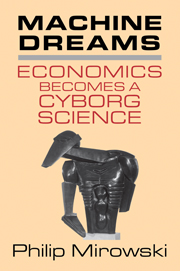Book contents
- Frontmatter
- Contents
- List of Figures and Tables
- Acknowledgments
- List of Abbreviations
- 1 Cyborg Agonistes
- 2 Some Cyborg Genealogies; or, How the Demon Got Its Bots
- 3 John von Neumann and the Cyborg Incursion into Economics
- 4 The Military, the Scientists, and the Revised Rules of the Game
- 5 Do Cyborgs Dream of Efficient Markets?
- 6 The Empire Strikes Back
- 7 Core Wars
- 8 Machines Who Think versus Machines That Sell
- Envoi
- References
- Index
8 - Machines Who Think versus Machines That Sell
Published online by Cambridge University Press: 05 June 2012
- Frontmatter
- Contents
- List of Figures and Tables
- Acknowledgments
- List of Abbreviations
- 1 Cyborg Agonistes
- 2 Some Cyborg Genealogies; or, How the Demon Got Its Bots
- 3 John von Neumann and the Cyborg Incursion into Economics
- 4 The Military, the Scientists, and the Revised Rules of the Game
- 5 Do Cyborgs Dream of Efficient Markets?
- 6 The Empire Strikes Back
- 7 Core Wars
- 8 Machines Who Think versus Machines That Sell
- Envoi
- References
- Index
Summary
We may trust “mechanical” means of calculating or counting more than our memories. Why? – Need it be like this? I may have miscounted, but the machine, once constructed by us in such-and-such a way, cannot have miscounted. Must I adopt this point of view? – “Well, experience has taught us that calculating by machine is more trustworthy than by memory. It has taught us that our life goes smoother when we calculate by machines.” But must smoothness necessarily be our ideal (must it be our ideal to have everything wrapped in cellophane)?
Ludwig Wittgenstein, Remarks on the Foundations of MathematicsOnce upon a time, a small cadre of dreamers came to share an aspiration to render the operations of the economy manifest and comprehensible by comparing its configuration to that of rational mechanics. It was a simple and appealing vision of continuous motions in a closed world of commodity space, uniformly propelled toward an equilibrium of forces; the forces were the wants and desires of individual selves. Each and every agent was portrayed as a pinball wizard, deaf, dumb, and blind to everyone else. Not everyone who sought to comprehend and control the economy harbored this particular vision; nor was the portrayal uniformly dispersed throughout the diverse cultures of the world; but the more people were progressively trained in the natural sciences, the more this dream came to seem like second nature. After a while, it no longer qualified as a dream, having graduated to a commonplace manner of speech. Economics was therefore recast in something tangible as the theory of a particularly simple kind of machine.
- Type
- Chapter
- Information
- Machine DreamsEconomics Becomes a Cyborg Science, pp. 517 - 574Publisher: Cambridge University PressPrint publication year: 2001

